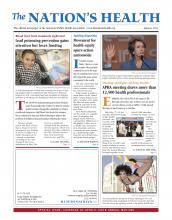New Affordable Care Act provisions will make identifying signs of domestic violence as routine as getting a mammogram or Pap smear, according to a recent journal article.
With preventive screenings such as mammograms prioritized in the 2010 health reform law, doctors are now encouraged to ask specific questions of females ages 12 and older to find signs of intimate partner violence and make referrals for professional counseling, according to a Nov. 29 article in the New England Journal of Medicine authored by two Boston University researchers.
Intimate partner violence is physical, psychological and sexual abuse suffered at the hands of a significant other such as a spouse or partner, according to the Centers for Disease Control and Prevention. As of August 2012, Affordable Care Act guidelines specify that intimate partner violence screening and counseling be covered by insurance providers as one of the essential benefits that are provided at no cost to women patients.
“Therefore, at a minimum, all primary care physicians should be screening female patients 12 years of age or older for IPV,” the article said.
Suggested interventions include giving handouts and hotline numbers to patients, providing information to child protective services in cases involving children and screening for possible anxiety or depression, said article co-author Jane Liebschutz, MD, MPH, an associate professor of medicine and social and behavioral sciences at Boston University School of Medicine and Boston University School of Public Health.
According to a report released by CDC in 2011, 35.6 percent of women and 28.5 percent of men have been victims of assault, rape or stalking by an intimate partner.
Health care costs for victimized women are 42 percent higher than for women who are not, the article said. Intimate partner violence victims more often suffer from ailments such as hypertension, gastrointestinal disorders and seizures. Health care costs in the first year after an assault range between $2.3 billion and $7 billion nationally, the article said. Unfortunately, while the health reform law covers domestic violence screening for women, it does not extend the same benefit to men.
The simple task of just asking questions can go a long way even if the patient is not a victim of intimate partner violence, Liebschutz told The Nation’s Health.
One example of questioning is the Hurt, Insult, Threaten and Scream screening tool, which originated in the late 1990s at the University of Illinois at Chicago Family Practice Residency. Using the tool, a doctor asks a patient on a scale of one to five — with one equaling “never” and five equaling “frequently”— how often she or he is physically hurt, verbally insulted, threatened with harm or screamed at. A point total exceeding 10 signals the patient is a victim.
Liebschutz warned doctors against counseling the patient him or herself without prior training on how to deal with victims of such violence. She said patients should be referred to expert counseling through either referrals or the National Domestic Violence Hotline at 1-800-799-7233.
Without expert help, questioning could do more harm than good, Liebschutz said. Liebschutz said that respecting confidentiality is essential in cases of potential backlash or prejudice from others for disclosing the abuse.
“I think that (health care) providers need to understand how to get the patients skilled counseling if patients are in a dangerous situation,” Liebschutz said.
There is no universal system for identifying intimate partner violence, Liebschutz said. She said there are two medical classification codes for domestic violence: “domestic abuse” and “domestic victim.” However, she said there are some states that mandate the reporting of domestic violence, though there is skepticism over where the information is being reported to and whether doctors have the ability to do anything about it.
“It’s not like certain communicable diseases, where there’s biological tests and you can report it,” Liebschutz told The Nation’s Health. “It’s more complex than that. It’s a social relationship. How to report it and what to report I don’t think is quite set yet.”
Liebschutz said one of the challenges to effective intimate partner violence screening will be “competing agendas” in the health care system, meaning a focus on immediate issues versus the underlying issues that may have led to the violence, as well as other health screenings. The American health care system can move toward a universal reporting system once health care professionals are able to do a better job at delineating what intimate partner violence is and its health consequences, Liebschutz said.
“If you did everything recommended by the U.S. Preventive Services Task Force you’d have zero hours in a day,” said Liebschutz referencing a list of recommended preventive screenings. “Do you get the Pap smear, mammogram (or) colonoscopy? Everything is competing in a short period of time.”
For more information on the article, visit http://www.nejm.org/doi/full/10.1056/NEJMp1204278.
- Copyright The Nation’s Health, American Public Health Association









